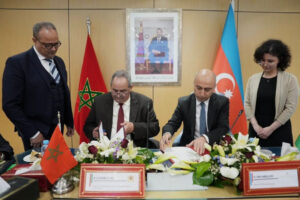Pashinyan’s Remarks Show Armenia’s Lack of Commitment to Sustainable Peace: Azerbaijan’s Foreign Ministry

Baku, The Gulf Observer: The Ministry of Foreign Affairs of the Republic of Azerbaijan has issued a formal response to remarks made by Armenian Prime Minister Nikol Pashinyan during a recent interview in Albania with Azerbaijan Public Television, calling his statements an attempt to mislead the international community regarding Armenia’s constitutional territorial claims and the status of the OSCE Minsk Group.
In a statement, Aykhan Hajizada, spokesperson for the Azerbaijani Foreign Ministry, stressed that international expressions of support for territorial integrity hold little weight in Armenia’s political practice, citing the country’s conduct during its accession to the 1991 Almaty Declaration. “The Armenian side has grossly violated the Declaration’s principles, particularly by attaching reservations and enacting legislation that directly contradicts recognition of Karabakh as part of Azerbaijan,” Hajizada stated.
He further criticized Prime Minister Pashinyan’s assertion that ratified international treaties take precedence over domestic laws in Armenia, describing it as baseless. “According to Article 5 of the Armenian Constitution, the Constitution itself holds supreme legal force, rendering the Prime Minister’s arguments irrelevant,” he said. Hajizada also highlighted that Armenia’s coat of arms, referenced in Article 21, symbolically reflects territorial claims against neighboring countries, contradicting the country’s stated commitments to regional peace.
The spokesperson recalled that despite peace negotiations since October 2022, Armenia continued supporting the so-called “puppet regime” in Karabakh until Azerbaijan’s anti-terror measures in September 2023, undermining the credibility of Yerevan’s commitments to territorial integrity.
Hajizada also noted Armenia’s longstanding refusal to adhere to the 1991 borders agreed upon under the Almaty Declaration and questioned the Armenian government’s reluctance to recognize borders reflected in Soviet-era maps. “For nearly 35 years, Armenia has failed to honor these commitments, raising doubts about its sincerity in the peace process,” he added.
In reference to the Armenian Constitutional Court’s decisions, Hajizada pointed to the 2010 ruling on normalization protocols with Türkiye and the 2024 decision regarding border delimitation with Azerbaijan, both of which cited the Declaration of Independence as an immutable component of Armenian statehood. “These rulings reveal that territorial claims, including to so-called ‘Western Armenia,’ remain entrenched in Armenia’s constitutional framework,” he said.
According to the Azerbaijani side, these constitutional elements pose a direct threat to Azerbaijan’s national security, and failure to amend them undermines efforts toward establishing lasting peace in the South Caucasus. “The Armenian leadership’s insistence on retaining these provisions while dismissing their implications indicates a lack of genuine commitment to sustainable peace,” Hajizada concluded.
He also criticized Armenia’s resistance to the official dissolution of the OSCE Minsk Group, describing it as a political maneuver to preserve mechanisms of the past conflict.
“Azerbaijan views constitutional reform in Armenia as a legitimate and essential condition for peace,” Hajizada emphasized, calling on the international community to take note of these fundamental issues hindering progress in the normalization process.

